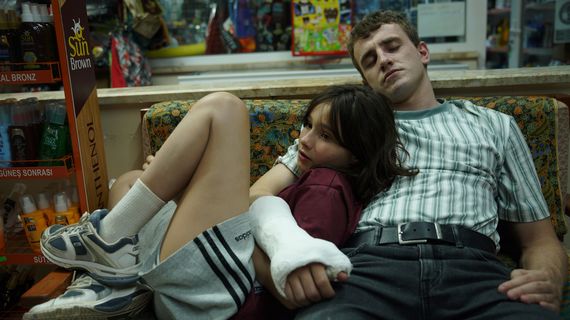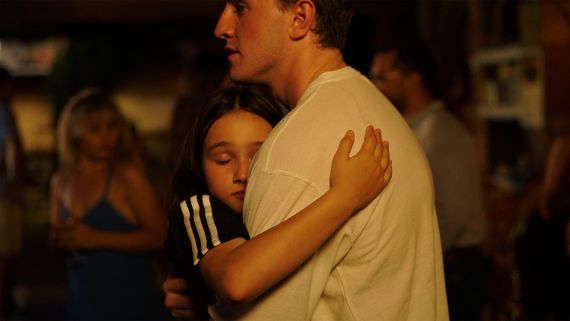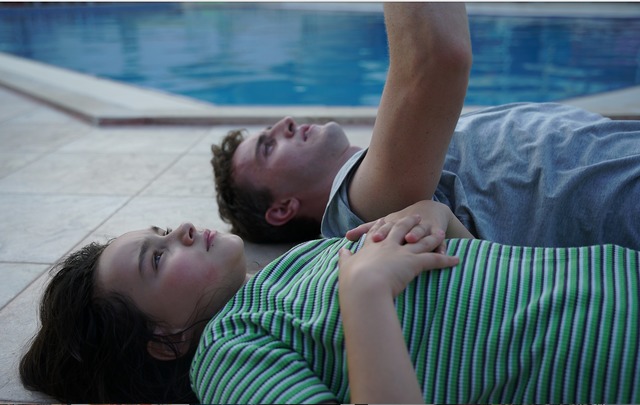Paul Mescal's breakthrough year continues apace with 'Aftersun,' a subtle and strange new film that has film awards buzz written all over it (it picked one up at Cannes this year).
Sometimes you see a new film that reminds you of the power and possibility of the medium itself and that's the best possible way to introduce "Aftersun," the unforgettable new film starring Paul Mescal as a haunted young father in what may well be his final days on earth.
From its first moments this quiet and impressionistic new film, directed by newcomer Charlotte Wells, signals that it's going to take its time - but the confident direction and acting onscreen signals that it's going to be worth it.
Starring "Normal People" newcomer Paul Mescal, 26, in what has turned out to be his breakout year, the film is a subtle and sensitive reflection of a frozen-in-time father and daughter summer holiday that still haunts the now grown-up daughter years later.
Mescal plays Calum, a 31-year-old Scottish father who has broken up with his former partner but still takes his daughter on a short summer holiday to Turkey to prove to her – and probably himself – that he's still a good man, not a deadbeat dad.
It turns out that the resort that Calum and his daughter Sophie are staying in is still under construction, with no one awake at the reception desk when they arrive late at night. Then, when they finally get the keys to their room they discover that it's a double bed when they had paid for two singles. Things start to spiral.
What this suggests – and this film is all about suggestion – is that Calum has paid for a cheap package holiday and that this less-than-five-star experience is the inevitable result.
But seen through the eyes of his doting daughter Sophie (played by gifted newcomer Frankie Corio) this trip is one for the history books, as she slowly steps into herself in a coming-of-age tale that will delight and haunt her in about equal measure for many years after.
Mescal hasn't put a foot wrong since his impressive debut in Sally Rooney's hit show, with critically acclaimed turns following that in films as various as "The Lost Daughter" and "God's Creatures."
But in "Aftersun" he does something truly challenging for a young actor, he finds the mystery of his character and he faithfully reproduces it onscreen, making this his most elusive and interesting screen performance to date. Mescal gives an unforgettable performance as a young man who seems to be at times literally tiptoeing on the edge of an inky black abyss.
Unfolding with the sharpness of memory and at other times with the softer edges of a dream, "Aftersun" plays with your investment and your perceptions. Is this a story that actually happened, we wonder, or is it the story that the now grown-up Sophie (played as a grown-up by Celia Rowlson-Hall) simply wishes had happened? Is it one desire superimposed over the other? What can we even trust here?

Paul Mescal and Frankie Corio star in 'Aftersun.'
That's not to say that "Aftersun" is an unreliable or frustrating watch, on the contrary, it unspools with the same seductive pace that memory does, allowing us to catch glimpses and impressions that we have to stitch together to get at the full story, the way most people do.
What is fascinating is that sometimes the holiday resort in the background looks down at heel, but other times it looks distinctly upscale. Equally the light and colors of Turkey are sometimes washed out, but other times they're as vivid as a Monet painting. We begin to wonder if this is how the details actually were or if this is how the grown-up Sophie now remembers them?
Mescal plays a young man who is trying, possibly not very successfully, to calm and center himself. He trains to and reads about Tai Chi. He has books on How To Meditate on his nightstand. He seems not to connect with most of the other adults circling around him. He has flashes of anger and irritation and he drinks more as the holiday stretches on.
There is a rich darkness haunting the edge of the frame in this film, just as there is in life, and that unsettling awareness makes this a particularly powerful journey. Mescal gives us both sides of the mirror, the man who is rescuing himself by being the hero his daughter needs as well as the crumpled-up victim, the man overcome by an unnamed dread he can't escape and instead surrenders too.
Which story wins, in the end, is left up to the viewer. Wells gives us the story we want and the story we get and says both can be true, and neither may solely define you.

Paul Mescal and Frankie Corio in Aftersun
I haven't seen a film be this brave in a while. Some might scoff that '"Aftersun" hedges its most difficult bets, seemingly offering all things to all viewers. But I would suggest that it stays true to its melancholic central premise: that this is a story about a lost summer in the early 2000s and the lost father who tried his best but didn't quite pull all the loose strands of his life together.
What happens after that, how the film resolves itself, what happens to Calum and Sophie seemed clear to me at the screening. Calum does not make it, but Sophie does, and the memory of that haunted summer and that haunted man both sustain and undermine her in the painful way that the most bittersweet memories do.
"Aftersun" is unsettling and strangely healing at the same time, then. It asks hard questions about parenting and its long legacy, it asks hard questions about grief and its long aftermath, but it also makes ample room for the sublime.
'Man hands on misery to man,' wrote the poet Phillip Larkin, 'it deepens like a coastal shelf, get out early as you can and don't have any kids yourself.' Essentially this is the journey of "Aftersun", but director Wells doesn't fully embrace Larkin's darkness. There has to be more the film and Sophie ask themselves.
Who is Calum? Who was he to himself? Why did he stop being with Sophie's mother? Why did he refuse to sing with her on their last night in the resort? What was the shadow that hung over him? What could he save, and what could save him?
To exist is very mysterious, the film reminds us. We connect for a time and hope to learn what there is to know of each other, but there is something between us – call it time and space – that always angles to drive us apart.
In "Aftersun" Sophie tries to scale the distance between her adult self and her lost childhood, between her father and his fate, and all she has left are some flickering images. But somehow they mean everything.
"Aftersun" opens nationally on October 21.




Comments